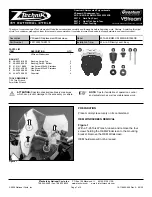
The stator is fixed to the inside of the cover so it is quite heavy. Tie it to
the bike to stop it hanging on the wires. Put the bike in 5th gear and
stand on the back brake, this should lock the crank well enough for you to
remove the bolt from the centre of the rotor. Screw the protector pad
into this thread then screw on the puller. Now rotate the engine (by the
back wheel) until the mark on the rotor lines up with the mark on the
crankcase (it is about one o’clock). The marks on the cam pulley wheels
should be in line with the horizontal break in the housing (i.e. the inlet
mark at 3 o’clock and the exhaust at 9 o’clock). If they are not, rotate the
engine 360 degrees and check again.
Now it is at TDC on the firing stroke, hold the puller body with a spanner
to stop it moving and tighten the puller bolt to remove the rotor.
When you remove the rotor a woodruff key and three large washers will
fall out. Remove the nut and spring washer from the bolt tensioner then
pull the tensioner wheel off, now you can remove the belt. When you fit
the new belt it is easy to be one tooth out because of the slack, so put the
belt on the crankshaft and work from the front keeping the belt tight as
you fit it first to the exhaust then the inlet.
Use your finger in place of the tensioner and check that the pulley marks
are in the correct place. If OK fit the tensioner and torque the nut to
28-30 Nm.
You can use an OHP (overhead projector pen) or similar to make marks
on the belt and cam wheels. Then you can transfer the marks to the new
belt when the old one is removed. Double check by counting the teeth on
the belt. If the wheels move out of line, you can simply re-align to the
marks on the new belt.
The tensioner spring should have correctly set the belt tension. Be very
careful with the new belt, make sure it is spotlessly clean, do not kink it
and do not use anything other than your (clean) fingers to fit it.
That’s it, now you just put it all back together. The washers behind the
rotor go big washer first with it’s angled edge facing out (away from the
pulley), next the two dished washers, one dish in the next dish out so
they will squash each other a bit as the rotor is tightened home. Copper
Slip the tapper, oil the bolt and don’t forget the woodruff key, torque to 40
Nm.
Late amendment
: Rather than putting it in 5th gear and standing on the
footbrake, look through the inspection holes in the rotor where you can
see a convenient casting (about 1 o’clock), so insert a rod through the
inspection hole, to bear on the casting (perfectly safe considering the
relatively small amount of torque involved) , give the bolt a twist and off
comes the rotor. AND/OR use a piece of wood through the rear wheel
resting on the swingarm. The wood being soft doesn’t damage the
spokes and keeps the wheel from moving.
1 - 1,3
Summary of Contents for Nordwest
Page 1: ...WORKSHOP MANUAL NORDWEST Nordcape in Germany ...
Page 26: ...INTENTIONALLY BLANK ...
Page 28: ...3 1 2 ...
Page 37: ...SECTION 4 INTENTIONALLY BLANK 4 ...
Page 44: ...6 1 2 ...
Page 45: ...6 1 3 ...
Page 49: ...7 1 ...
Page 51: ...7 2 2 ...
Page 52: ...7 2 3 ...
Page 54: ...7 2 5 ...
Page 56: ...CYLINDER PISTON 8 8 Diagram Disassembly Inspection Reassembly Section Page 8 1 8 2 8 2 8 2 ...
Page 57: ...8 1 ...
Page 59: ...8 2 2 ...
Page 61: ...8 2 4 ...
Page 63: ...9 1 ...
Page 65: ...9 2 2 ...
Page 66: ...9 2 3 ...
Page 69: ...10 1 ...
Page 71: ...10 2 2 ...
Page 77: ...12 1 ...
Page 96: ... 15 4 ...
Page 114: ...ELECTRIC STARTER 18 18 1 2 ...
Page 117: ...19 1 2 ...
Page 121: ...TROUBLESHOOTING 20 20 1 ...
Page 122: ...20 2 1 TROUBLESHOOTING 20 Continued on page 20 2 2 ...
Page 123: ...20 2 2 TROUBLESHOOTING 20 Continued from page 20 2 1 ...
Page 124: ...20 3 TROUBLESHOOTING 20 ...
Page 127: ...21 1 2 ...
Page 129: ...21 2 2 ...
Page 131: ...21 3 2 ...








































